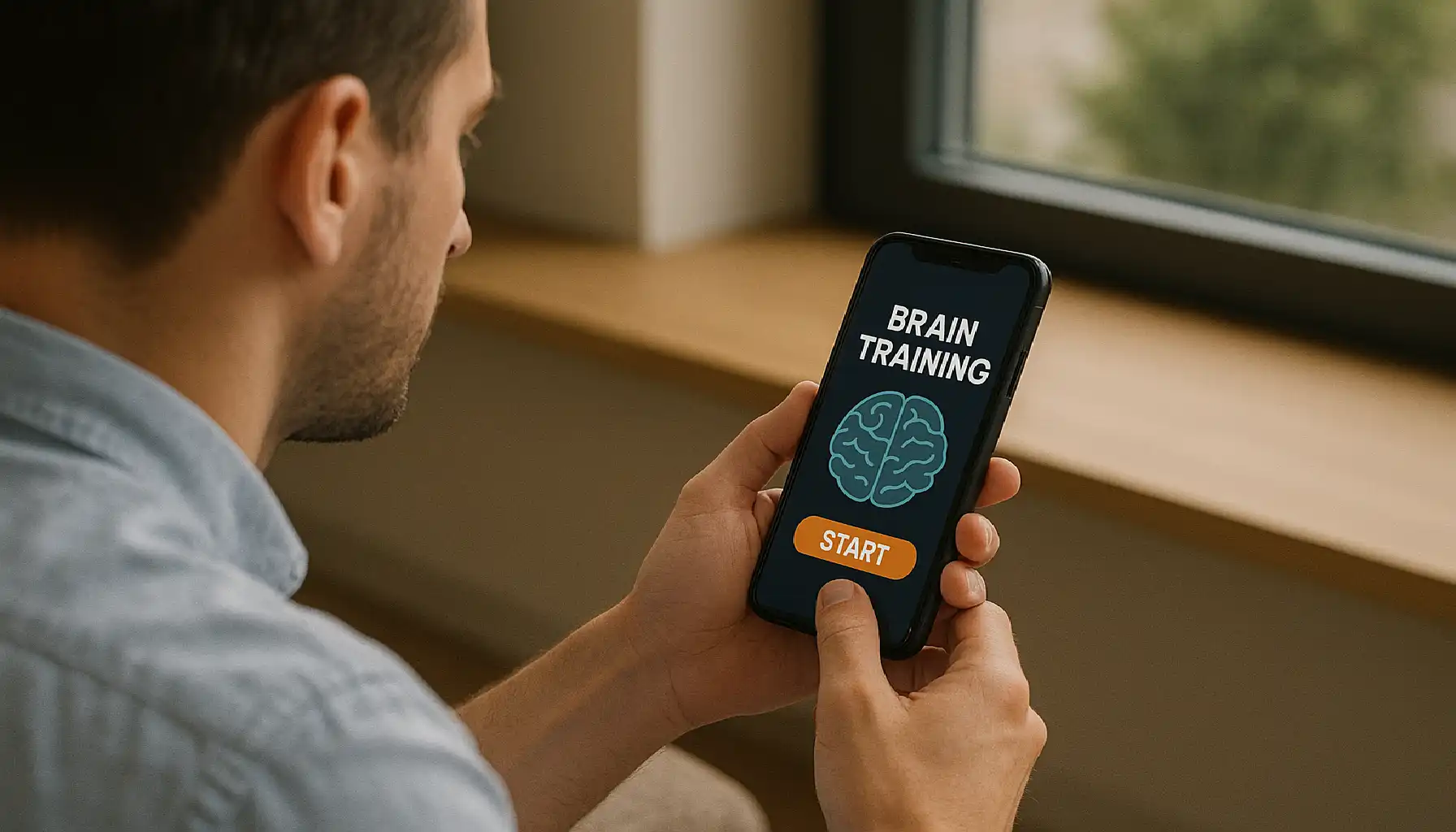Contents:
Anyone can sharpen thinking skills, improve reaction time, or stop blanking out during important moments. But how to achieve it? Well, it’s a long process, and you will have to be disciplined and determined enough to get there. One of the best tools to begin with is the Mind Elevate app. Available on Android, this app has a full suite of brain-training games, like logic puzzles or memory drills. Why games? Because they will help you build mental clarity even when you don’t have enough time for mental exercises.
At least it’s better than passive scrolling or basic puzzle apps. Mind Elevate will give you a personalized brain-training plan based on your strengths and weak spots. You can monitor the progress in math, attention, and decision-making. So it’s great for anyone who wants to think faster in real-time situations, like at work, school, or in social settings.
Thinking about how to train your brain to think faster? This app has a low-stress and science-based starting point. And once you’ve warmed up your brain with this simple app, you can add even more strategies for mental speed.

What Makes Someone a Fast Thinker?
You don’t need to blurt out the first answer to be a fast thinker. The more correct definition of fast thinking is processing information quickly, making smart decisions under pressure, and adapting to new information. Quick thinkers are often good at noticing patterns, recalling useful facts, and responding clearly.
Research shows this kind of thinking is closely tied to strong working memory, fluid intelligence, and activation in the prefrontal cortex. It’s a brain region associated with judgment and problem-solving, and yes, you can exercise it at any age. Just like physical strength, mental speed can be trained and improved.
Yes, mental flexibility can decline with age, but that doesn’t mean it has to. Starting in your late 30s or early 40s, the brain may begin to show small changes in how quickly it processes information or adapts to new tasks. It’s even more noticeable for many people after 60. These changes are happening because of reduced gray matter in areas like the prefrontal cortex, slower communication between brain regions, and a natural drop in certain neurotransmitters. These shifts are real, they’re not a dead end. Your brain remains capable of learning and adapting well into later life, it’s a concept known as neuroplasticity. To keep it sharp, you need to always take care of it and do some exercises. Lucky to you, there are plenty of sources on the web that can actually help with this task.
Also read: Secrets Revealed: How to Improve Short Term Memory.

Fast Thinking | Slow Thinking |
Quick decision-making | Overthinking and hesitation |
Confident speech | Frequent use of filler words |
High working memory and focus | Easily distracted or overwhelmed |
Responds well under pressure | Struggles in real-time situations |
Learns through pattern recognition | Needs more time for analysis and certainty |
Benefits of Thinking Fast in Real Life
Thinking quickly gives you benefits. People who respond fast in conversations are often seen as more charismatic, confident, and competent. In professional environments, like offices, fast thinkers are more likely to:
Make better decisions under pressure
Avoid overthinking and “analysis paralysis”
Gain respect for being sharp and efficient
Catch problems before they escalate
Handle stress better and stay focused
In social settings, fast thinking can help you speak successfully when you're put on the spot. It’s a skill actually highlighted in one good book called Think Faster, Talk Smarter: How to Speak Successfully When You’re Put on the Spot. You can read it to get some skills for meetings, interviews, or casual conversations, because being able to think on your feet builds confidence and trust.

How to Build Your Fast-Thinking Ability
So how to think faster without sounding rushed or reckless? We have ten proven methods, practical and science-backed. They may help you increase mental speed and clarity.
Trust what you know. Confidence in your existing knowledge speeds up your thinking. If you are familiar with a topic, your brain will quicker retrieve and use that information. Experts in any field look fast because their brains are better trained to recognize patterns.
Train your brain like a muscle. Thinking speed improves with exercise. You can use apps like Mind Elevate or stick with classic brain challenges such as Sudoku, crosswords, memory games, or math drills. The secret to how to train your brain to focus and think faster, repetition and variety are important. Just 10–15 minutes a day of focused mental exercise can make a long-term impact.
Learn to meditate. It might seem like slowing down, but meditation trains your brain to stay calm, focus better, and react faster. It reduces mental noise, improves attention span, and sharpens your decision-making under pressure. Even five minutes of mindfulness a day helps you build a stronger foundation for fast thinking.
Move your body. Physical activity improves brain function. It increases blood flow, boosts memory, and improves your brain’s adaptability, all of which contribute to better and faster thinking. Walking, cycling, dancing, or even light stretching can enhance cognitive processing speed. If you’re serious about learning how to make your brain think faster, a healthy body plays a big part.
This is especially helpful when learning how to be smarter and think faster. Don’t try to master everything. Instead, focus on strengthening your main concerns and use your experience to answer quickly and accurately.
Get enough sleep. Sleep is non-negotiable for mental clarity. When you're well-rested, your brain retrieves and processes information faster. Sleep supports memory consolidation, focus, and emotional regulation. It’s all necessary for thinking faster and sharper. Try to maintain a consistent sleep schedule, especially if you're trying to train your brain to function better under pressure.
Avoid filler words. Want to master how to think faster in conversations? Start by speaking cleaner. Filler words like “uh,” “um,” and “like” can make you sound hesitant. Instead, allow yourself a brief silent pause to gather your thoughts. Fewer verbal hiccups = faster perceived intelligence. It’s a small trick with a big effect. You may also try to use heteronyms more.
Practice thinking in real-time. Put yourself in real-time scenarios where you need to think fast. This could be quick-fire Q&A games, sessions, or decision-making simulations. This is the core skill taught in public speaking courses and in books. The more you expose yourself to these situations, the more comfortable and quicker your thinking becomes.
Read often and widely. Reading helps you recognize patterns, spot logical connections, and expand your vocabulary, all of which is helpful for faster thinking and communication. Diversify your content: articles, essays, novels, opinion pieces, and technical material.
Make small decisions without delay. Not every choice requires a debate. Practice speed by making small, low-risk decisions quickly, like picking lunch, choosing a route, or replying to short emails. These micro-decisions build your habit of mental efficiency. If you want to know how to make your brain think faster, this is one of the simplest daily practices: act decisively on things that don’t need deep thinking.
Stay curious. Curiosity keeps your brain alert and engaged. Ask questions, challenge ideas, and explore new interests. Curious people make faster thinkers because their minds are already used to learning, switching topics, and making mental connections. Curiosity fuels your mental speed more than raw IQ, especially when it’s directed at things that matter to you.

Train It, Don’t Fake It
You don’t need to fake quick thinking. You can train for it, just like any other skill. If you want to get better at public speaking, make decisions faster at work, or just feel less scattered in daily life, the tools are here. Use Mind Elevate to start and build daily habits that challenge your brain. Push yourself to speak clearly and confidently. And stay consistent.
Because if you want to think faster talk smarter, the secret is to train your brain to process quickly, act with clarity, and stay sharp under pressure. You’ve got the tools. Now build the skill.





